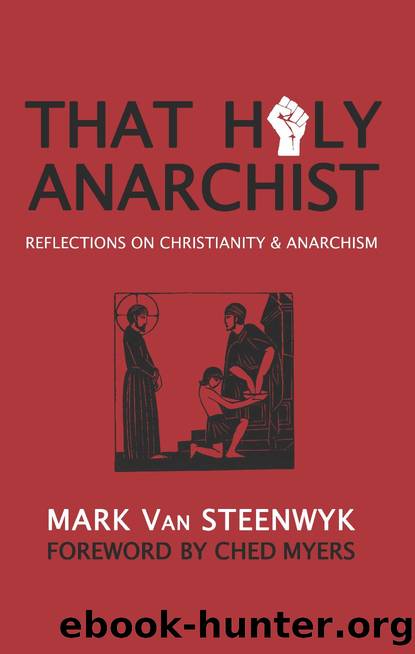That Holy Anarchist by Mark Van Steenwyk

Author:Mark Van Steenwyk [Van Steenwyk, Mark]
Language: eng
Format: azw3
Publisher: Missio Dei
Published: 2012-06-26T00:00:00+00:00
But What About...?
There remain many open questions. My point here isnât so much to defend an anarchic read of Scripture as much as it is to give a sketch of the possibilities. We read Scripture in ways that support authoritarianism because we learned how to read Scripture in authoritarian contexts. Once you start pulling the loose threads, you begin to find the whole authoritarian fabric unravelling. For sake of brevity, Iâll address the two most commonly raised passages against Christian anarchism.
The first is Romans 13, where Paul tells his readers to âsubmit to the governing authoritiesâ:
Let every person be subject to the governing authorities. For there is no authority except by Godâs appointment, and the authorities that exist have been instituted by God. So the person who resists such authority resists the ordinance of God, and those who resist will incur judgment (for rulers cause no fear for good conduct but for bad). Do you desire not to fear authority? Do good and you will receive its commendation, for it is Godâs servant for your good. But if you do wrong, be in fear, for it does not bear the sword in vain. It is Godâs servant to administer retribution on the wrongdoer. Therefore it is necessary to be in subjection, not only because of the wrath of the authorities but also because of your conscience. For this reason you also pay taxes, for the authorities are Godâs servants devoted to governing. Pay everyone what is owed: taxes to whom taxes are due, revenue to whom revenue is due, respect to whom respect is due, honor to whom honor is due.[27]
When interpretting this passage, there are several things that one must keep in mind:
1) This passage occurs immediately after Romans 12, where Paul challenges his readers to bless persecutors, live peaceably, never avenge, feed enemies, and overcome evil with good. By clear implication, the âgoverning authoritiesâ are persecuting enemies whose evil needs to be overcome with good. Given that Paul is likely drawing directly from Jesusâ teachings, it may be best to interpret the call to âbe subjectâ as an application of the call to âturn the other cheek.â It is not a call to mere obedience or happy citizenship.
2) Jacques Ellul suggests âthe passage thus counsels nonrevolution, but in so doing, by that very fact, it also teaches the intrinsic nonlegitimacy of institutions.â[28] In other words, the very fact that Paul has to argue, in light of enemy-love, that the people should forsake (violent) resistance reveals that the âgoverning authoritiesâ are, in some sense, worthy of revolt. Just like Jesusâ call to turn the other cheek recognizes that, under normal circumstances, one would hit back. To refrain from violence is a testimony to the the Roman Christian's goodness, not the goodness of Rome.
3) John Howard Yoder (and others) have (rightly) challenged translating the Greek word tasso as âinstituted.â Rather, Yoder argues that a better translation would be that the authorities are ârestrainedâ by God. Therefore, Paul could be advising his readers against revolt since God is already restraining the rulers.
Download
This site does not store any files on its server. We only index and link to content provided by other sites. Please contact the content providers to delete copyright contents if any and email us, we'll remove relevant links or contents immediately.
| Africa | Americas |
| Arctic & Antarctica | Asia |
| Australia & Oceania | Europe |
| Middle East | Russia |
| United States | World |
| Ancient Civilizations | Military |
| Historical Study & Educational Resources |
The Third Pole by Mark Synnott(952)
Money for Nothing by Thomas Levenson(947)
The Economist (20210109) by calibre(937)
Christian Ethics by Wilkens Steve;(860)
Made in China by Anna Qu(854)
The Age of Louis XIV: The Story of Civilization by Will Durant(831)
Nonstate Warfare by Stephen Biddle(813)
Reopening Muslim Minds by Mustafa Akyol(812)
100 Posters That Changed The World by Salter Colin T.;(784)
Culture by Terry Eagleton(776)
The Shortest History of China by Linda Jaivin(776)
The Great Pyramid Void Enigma by Scott Creighton(761)
The Irish Buddhist by Alicia Turner(759)
Ideology by Eagleton Terry;(743)
Routledge Handbook of Contemporary India by Knut A. Jacobsen(740)
Sybille Bedford by Selina Hastings(688)
The Jews of Silence: A Personal Report on Soviet Jewry by Elie Wiesel(687)
Banaras: CITY OF LIGHT by Diana L. Eck(678)
Objects of Vision by Saab A. Joan;(670)
